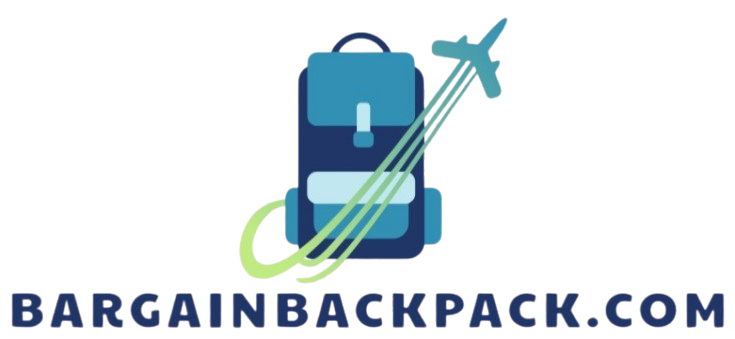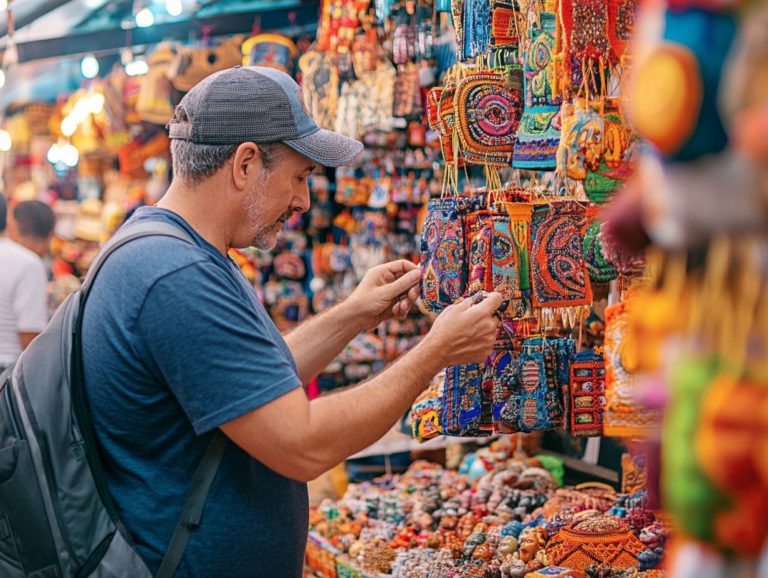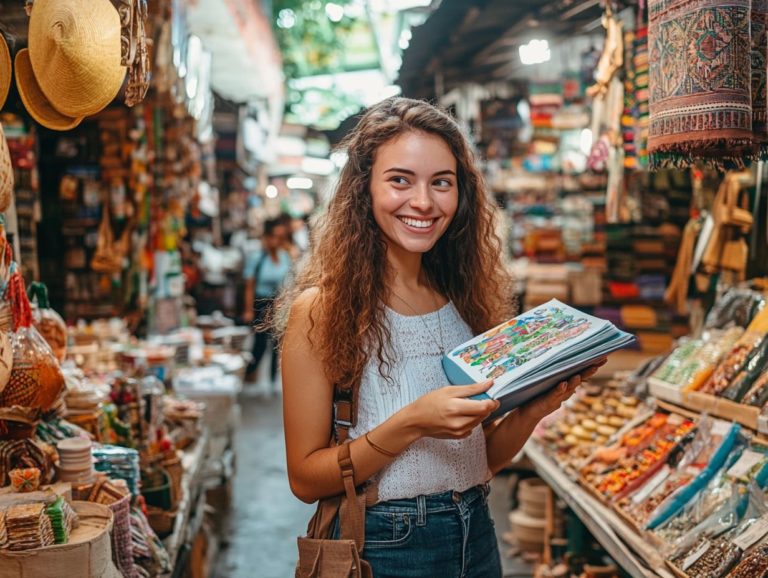What to Consider When Choosing a Travel Budget?
Planning a trip can spark a thrilling sense of adventure, but keeping your finances in check is crucial for a stress-free experience.
Understanding travel budgets gives you control over your spending and empowers you to maximize your funds. This article delves into what a travel budget entails and why it is important, along with vital considerations such as your destination and travel style.
You ll also discover practical tips for crafting a realistic budget and maintaining it, allowing you to focus on creating unforgettable memories instead of fretting over costs.
Contents
- Key Takeaways:
- Understanding Travel Budgets
- Factors to Consider When Choosing a Travel Budget
- Creating a Realistic Travel Budget
- Tips for Sticking to Your Travel Budget
- Frequently Asked Questions
- What to Consider When Choosing a Travel Budget?
- How much should I allocate for transportation?
- Should I include accommodation costs in my budget?
- What other expenses should I budget for?
- How can I save money on my travel budget?
- Should I consider travel insurance when choosing my budget?
- What happens if I go over my budget while traveling?
Key Takeaways:
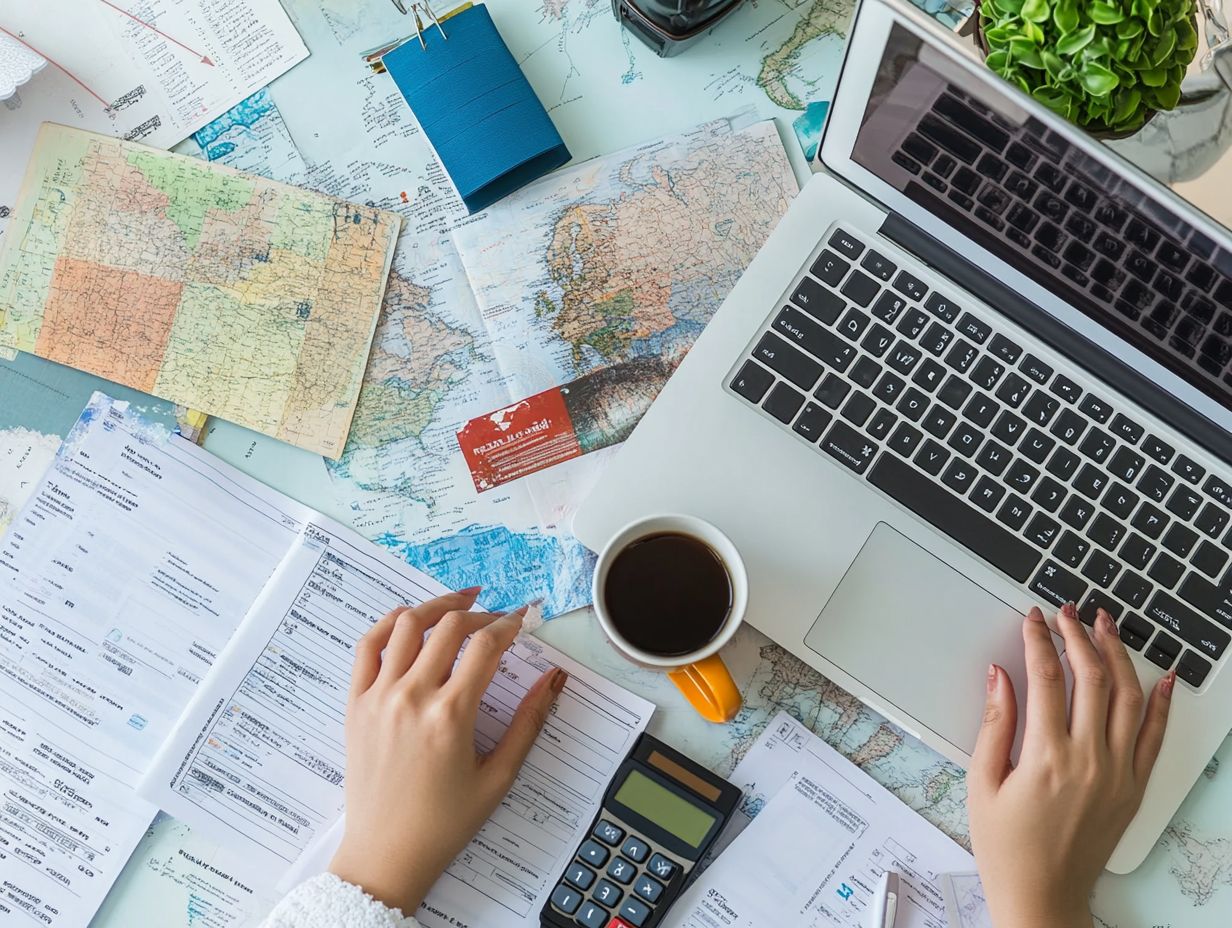
- Research and factor in the destination, season, and length of trip when creating a budget to ensure it is realistic and meets your travel goals.
- Consider your travel style and preferences when choosing a budget, whether it be luxury or budget-friendly, to ensure a comfortable and enjoyable experience.
- Keep track of expenses and make necessary adjustments to stick to your budget, including choosing budget-friendly activities and accommodations to save money while traveling.
Understanding Travel Budgets
Understanding travel budgets is crucial for successful vacation planning. It enables you to establish a clear plan for your money and embark on your dream trip without the burden of overspending.
A carefully made travel budget allows you to allocate funds across various categories, including transportation, lodging, dining, and activities. It also factors in local costs and fluctuating exchange rates that can influence your overall experience.
It s important to include extra money set aside for unexpected costs. Mastering your budget gives you the power to prioritize your vacation goals and manage your finances effectively, ensuring that you can enjoy your journey with complete peace of mind.
What is a Travel Budget?
A travel budget serves as your detailed plan that outlines expected costs for various aspects of your trip. It allows you to manage your finances effectively throughout your journey.
This financial blueprint typically covers several key spending categories, such as lodging, activities, food, and transportation. By breaking down these elements, you can allocate your funds more wisely and avoid overspending in any single area.
It is essential for anyone embarking on a budget-conscious adventure to diligently track their spending, whether through an app or a simple notebook. This practice helps maintain financial discipline.
Additionally, incorporating a buffer for emergencies is crucial; travel can be unpredictable, and having that safety net can significantly enhance your experience.
Why is it Important?
Creating and sticking to a travel budget is essential for managing your wealth effectively. It allows you to allocate your resources wisely and sidestep financial stress during your vacation.
Without a well-structured budget, it s easy to overspend, leading to significant financial strain that lingers long after your trip has ended. This oversight can turn a dream getaway into a financial headache, weighed down by debt and overdue bills.
A solid budget not only helps you save for your adventures but also allows you to prioritize experiences that truly resonate with you. By keeping a close watch on your expenses and setting realistic savings goals, you can enjoy the freedom of exploring new destinations without the nagging worry of financial repercussions.
Factors to Consider When Choosing a Travel Budget
When setting your travel budget, several key factors come into play: your destination, the season you’re traveling in, and the length of your trip. These elements significantly impact your overall travel costs.
By understanding these variables, you can tailor your budget to align with your vacation priorities. For instance, traveling during off-peak seasons often unlocks better hotel discounts. Familiarizing yourself with local currency and exchange rates gives you the power to make informed spending decisions.
Creating a mock itinerary can be a valuable tool, helping you visualize your budget needs and plan accordingly.
Destination and Season

The choice of your destination and the season you travel in can significantly impact your travel costs. Certain locations become more affordable during off-peak seasons, while others may have high exchange rates that affect your overall budget.
For example, if you set your sights on iconic European cities like Paris or Rome during the summer months, be prepared for a spike in accommodation prices and airfare. This makes your dream getaway quite expensive. On the flip side, visiting these cities in winter or early spring can unlock better deals, as hotels often reduce rates to entice visitors during quieter months.
Similarly, popular beach destinations like Cancun experience a surge in costs in December and January due to holiday travelers. However, prices plummet from late spring to early fall. By grasping these seasonal fluctuations, you can dramatically improve your travel experience and maximize your budget while soaking in the charm of these diverse locales.
Length of Trip
The length of your trip directly influences your travel budget. Longer vacations generally lead to higher costs for lodging, food, and activities.
Staying longer can quickly increase these costs, potentially derailing even the most carefully crafted budget. By planning your itineraries and accommodations strategically, you can uncover cost-effective lodging options that provide comfort and convenience. Opting for local eateries instead of tourist traps allows you to savor authentic flavors without straining your wallet.
Research local attractions that offer discounts for longer stays, like multi-day passes, which are tickets covering several days of entry to attractions at a lower overall price. This enhances your overall experience while keeping your finances in check.
Travel Style and Preferences
Your travel style and personal preferences significantly shape your budget, as different approaches lead to various costs for accommodations, activities, and dining options.
If you lean towards luxury travel, you ll likely find yourself in high-end hotels or exclusive resorts, where plush furnishings, spa services, and personalized concierge experiences are standard.
On the flip side, if budget travel is more your groove, you might opt for hostels, guesthouses, or vacation rentals, immersing yourself in local culture while keeping a tight rein on expenses.
If you re hunting for budget-friendly options, consider using apps to snag last-minute deals on accommodations or explore local markets for authentic culinary experiences at a fraction of the cost.
Engaging in free or low-cost activities, such as hiking, museum days, or cultural festivals, can elevate your travel experience without straining your wallet.
By employing smart strategies, you can embrace the joys of travel while maintaining both quality and the essence of your destination.
Creating a Realistic Travel Budget
Crafting a realistic travel budget requires diligent research into the costs linked to your destination. It’s essential to consider both anticipated expenses and unexpected surprises that can crop up during your journey.
Doing so ensures a smoother travel experience and helps you avoid financial pitfalls along the way.
Researching Costs and Expenses
Researching costs and expenses is an essential step in creating your travel budget. This allows you to craft a comprehensive list of travel expenses that includes accommodation types, activities, and local costs.
To enhance this process, take advantage of various online tools like budgeting apps and expense calculators, which simplify your planning. Websites such as Kayak, Skyscanner, and Expedia offer quick comparisons of flight and hotel prices. Local forums and travel blogs can reveal hidden gems and authentic experiences that won t break the bank.
Utilizing spreadsheets will help you organize your collected data effectively, making it easier to adjust and refine your budget as needed. By comparing costs across different platforms, you can make informed decisions and avoid overspending, ensuring a memorable journey free from financial stress.
Start planning now!
Accounting for Unexpected Expenses
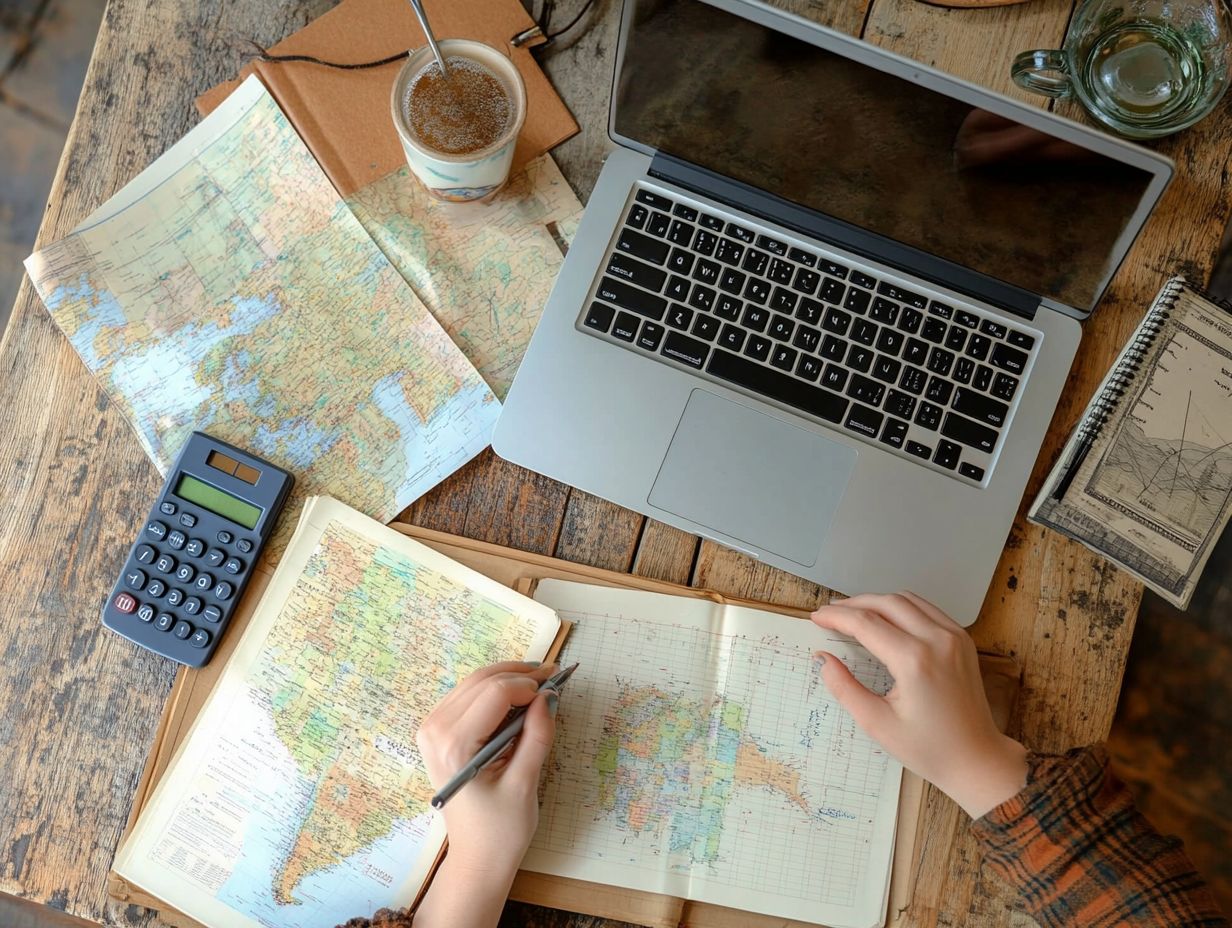
Accounting for unexpected expenses is essential when crafting your travel budget. These unforeseen costs can swiftly disrupt your financial plans if not properly managed.
As a traveler, you may encounter issues like flight delays, sudden medical emergencies, or even lost luggage. Each of these can strain your budget if you’re caught off guard. Establishing an emergency fund specifically for travel is vital. Ideally, this fund should consist of a few hundred dollars, giving you quick access in urgent situations.
Travel insurance can boost your confidence while traveling. It serves as a safety net, covering everything from trip cancellations to unexpected medical expenses. Take charge of your journey by planning ahead and setting up these safeguards!
Tips for Sticking to Your Travel Budget
Sticking to your travel budget may feel daunting. However, incorporating a few strategic tips can empower you to manage your finances effectively while still indulging in delightful, budget-friendly experiences.
Budget-Friendly Activities and Accommodations
Choose budget-friendly activities and accommodations to stay on track. These savvy choices can significantly cut overall expenses without sacrificing the quality of your experience.
Consider exploring options like hostels. They not only provide affordable lodging but also foster opportunities for memorable interactions with fellow travelers. You might just find unexpected friendships and stories you’ll treasure.
Vacation rentals, often available through popular platforms favored by astute travelers, offer unique local experiences and the chance to whip up meals with seasonal ingredients.
Diving into local culture through street food tours opens up a delightful array of flavors while keeping dining costs in check. These budget-conscious choices not only elevate your adventure but also ensure you have more funds available for excursions, local attractions, or little indulgences that enhance your journey.
Tracking Expenses and Making Adjustments
Track your expenses regularly to keep your travel budget under control. This practice helps you stay aware of your spending habits and adapt your plans as needed.
To do this effectively, consider using budgeting apps that automatically categorize your expenses. They offer real-time insights into where your money is flowing. Alternatively, you might opt for a daily log whether it s in a notebook or a digital format to help you stay disciplined and focused on your financial goals.
Regularly reviewing your budget is crucial. It allows you to fine-tune your financial objectives and identify areas where you might be overspending. By recognizing these patterns, you can enhance your financial awareness, ensuring that your travel experience remains both enjoyable and stress-free.
Frequently Asked Questions
What to Consider When Choosing a Travel Budget?
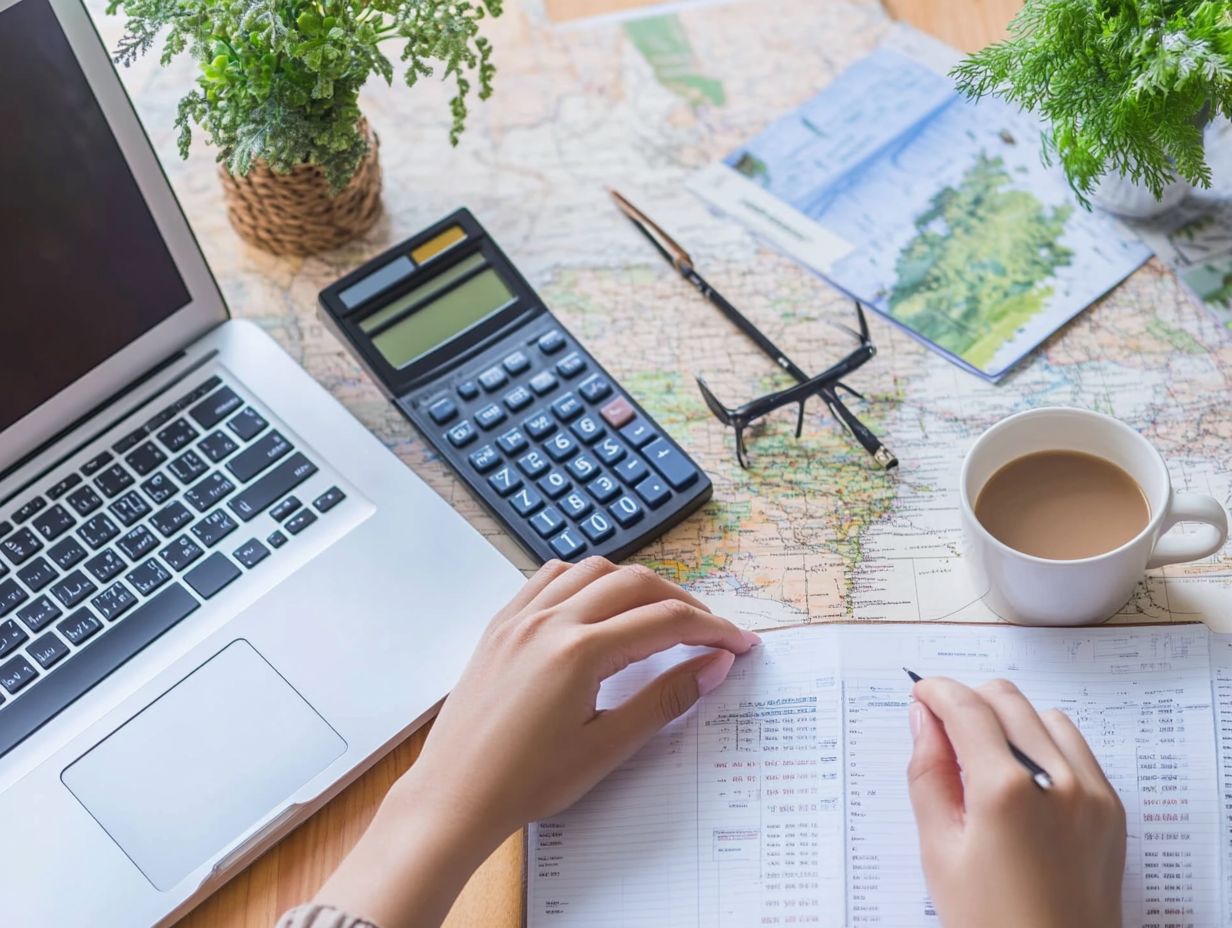
When planning for a trip, one of the most important things to consider is your travel budget. Additionally, knowing what to pack for budget travel can help you make the most of your resources. Here are some factors to keep in mind:
How much should I allocate for transportation?
The amount you allocate for transportation will depend on your mode of travel and destination. For example, airfare to a popular tourist destination will likely be more expensive than a train ticket to a nearby city. Research options and book in advance to get the best deals.
Should I include accommodation costs in my budget?
Yes, it’s important to include accommodation costs in your budget. Consider the type of accommodation you prefer (hostels, hotels, Airbnb) and research prices in your desired location to determine a realistic budget.
What other expenses should I budget for?
In addition to transportation and accommodation, budget for food, activities, and any visa or entry fees. It’s also a good idea to have some extra money set aside for unexpected expenses.
How can I save money on my travel budget?
There are many ways to cut down on expenses while traveling. Look for budget-friendly places to stay and choose public transportation instead of taxis.
Opt for free or low-cost activities. Researching and comparing prices before you book is essential!
Should I consider travel insurance when choosing my budget?
Travel insurance is a smart choice! It can cover unexpected events like medical emergencies, trip cancellations, and lost luggage.
Don t forget to factor in the cost of travel insurance when setting your budget!
What happens if I go over my budget while traveling?
If you exceed your budget, cut back on unnecessary expenses. Look for ways to earn extra money if needed.
Having a backup plan, such as a credit card with a high limit, can also help. Consider reaching out to a trusted friend or family member for financial support.
